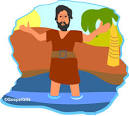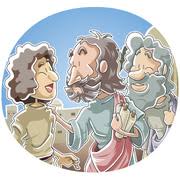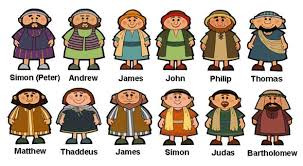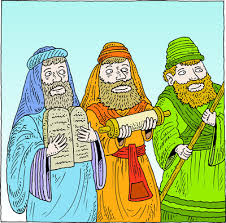Galatians 4:17 – They make much of you, but for no good purpose. They want to shut you out, that you may make much of them.
In this verse, "they" refers to the Jewish teachers that have led the Galatians astray, claiming that works of the law must be added to grace in order to receive salvation.
 Paul is explaining to the Galatians that these false teachers 'make much of you', or in other words, they pretend to have great love and affection for you by being overly concerned with your welfare and everything that affects you. But their love is as false as their teachings. It was all a charade, masking their hidden agenda. Their real goal was to drive a wedge between Paul and the Galatians.
Paul is explaining to the Galatians that these false teachers 'make much of you', or in other words, they pretend to have great love and affection for you by being overly concerned with your welfare and everything that affects you. But their love is as false as their teachings. It was all a charade, masking their hidden agenda. Their real goal was to drive a wedge between Paul and the Galatians.Why would they want to do that?
If they could destroy that relationship, then the Galatians would automatically reject Paul's doctrine of grace (justification by faith). Naturally, the Galatians would then follow the leadership of the false teachers, who would bring them into bondage by attempting to mix grace with works of the law.
Rejecting the doctrine of grace would also cut the Galatians off from the true body/church of Jesus Christ. If that happened, the only option left to them would be to give total devotion to the false teachers and their corrupt doctrine. Again, the false teachers would get exactly what they wanted. It was a diabolical and brilliant plan, and the Galatians fell for it hook, line and sinker!
Make no mistake - this is a serious issue. Unless someone opens the eyes of the Galatians, they will be fooled by false teachers and lose/forfeit their salvation.
This is why Holy Spirit brings Paul back into the situation. Out of a fatherly spirit of love and devotion, Paul reveals the truth to the Galatians. In so doing, he accomplishes several things:
- He opens their eyes to the deception that has trapped them.
- He opens up a way of reconciliation between himself and the Galatians.
- He makes it possible for the Galatians to return to justification by faith.
Galatians 4:18 – It is always good to be made much of for a good purpose, and not only when I am present with you,
Zeal or ardent love and concern for others are good things, as long as it is for a just purpose. As we recall, back in verse 15 the Galatians had such a zeal and love for Paul and the gospel. They were willing to "gouge out" their own eyes and give them to Paul if that were possible. This was a good thing because the Galatians had pure motives. Unlike the false teachers, they had no hidden agenda or ulterior motive.
But the Galatians had abandoned their righteous zeal for Paul and the gospel, almost immediately after he left them. Paul reasons that he was a good man and worthy of their affections when he was present with them; likewise he is a good man and worthy of their affections when he was absent from them. Since that was the case, they would do well to continue in their relationship with him and to continue in grace.
Galatians 4:19 –my little children, for whom I am again in the anguish of childbirth until Christ is formed in you!
For his part, Paul continues to have a sincere, ardent love for the Galatian believers. He has a genuine and pure concern for them, similar to what a natural father would have for his fleshly offspring. Paul refers to this love when he addresses them as 'my little children'. And indeed, spiritually speaking, they are his children. Through the power and anointing of Holy Spirit, Paul has 'birthed' them into the kingdom of heaven through the preaching of the gospel.
 The affectionate term 'my little children' also implies that there should be a process of 'growing up'. In the natural realm, infants are fed milk and constantly held until they begin to mature, eating solid food and taking care of themselves. Eventually, they come to maturity, reproduce and continue the cycle of life in the next generation.
The affectionate term 'my little children' also implies that there should be a process of 'growing up'. In the natural realm, infants are fed milk and constantly held until they begin to mature, eating solid food and taking care of themselves. Eventually, they come to maturity, reproduce and continue the cycle of life in the next generation.
This is what Paul expected to happen to the Galatians in the spiritual realm. He had birthed them into the kingdom. They should be growing in grace and taking steps along the path to spiritual maturity, becoming more and more like Christ. Unfortunately, the false teachers led them away from the path to maturity.
Hebrews 5:12-14 - For when for the time you ought to be teachers, you have need that one teach you again which be the first principles of the oracles of God; and are become such as have need of milk, and not of solid food. For every one that uses milk is unskillful in the word of righteousness: for he is a babe. But solid food belongs to them that are of full age, even those who by reason of use have their senses exercised to discern both good and evil.
In this case, Paul finds himself in a place where he must birth them into Christ all over again! Paul must once again endure all of the pain and labor of birth to get the Galatians back on the right track.
Galatians 4:20 – I wish we could be present with you now and change my tone, for I am perplexed about you.
Remember, Paul is communicating with the Galatians by means of a written letter. In our day and age, that is certainly an archaic form of communication! Not only that, it is inefficient as well.
Here is what I a mean by that: There is no real exchange of ideas in a letter. The writer expresses his thoughts to the reader but he does not have the benefit of any feedback or clarification. If he wants that, he must wait and hope that the reader will write back to him. It could literally take weeks until there is any return communication on the subjects/ideas in the letter.
 Now contrast that with conversations that take place in person (or even by phone or zoom). In that case, there is an instantaneous exchange of ideas, a discussion of the issues at hand and immediate clarification of any misunderstandings. Clearly, it would be much easier for people to resolve their differences in person, rather than by letters.
Now contrast that with conversations that take place in person (or even by phone or zoom). In that case, there is an instantaneous exchange of ideas, a discussion of the issues at hand and immediate clarification of any misunderstandings. Clearly, it would be much easier for people to resolve their differences in person, rather than by letters.
With that in mind, we can easily see why Paul desires to be 'present' with the Galatians.
- He cannot understand what has caused them to abandon their faith in the true gospel of justification by faith.
- He cannot understand how they would once again pick up the bondage of the law, when grace had relieved them of that burden.
- He cannot understand how the Galatians could fully trust him as their spiritual father, but then abandon their relationship with him in such a short amount of time.
As Paul indicates, it would be much easier to get those answers 'in person' rather than by letter.
Galatians 4:21 – Tell me, you who desire to be under the law, do you not listen to the law?
The phrase 'tell me' is a call to reasoning. It invites the reader to stop, consider and explain their point of view. It actually helps them clarify what they believe. This is exactly what Paul wants them to do. He wants them to fully and thoughtfully consider their return to the law.
As they do so, Paul will now take the time to once again illustrate the profound difference between the law and grace. He will show the effect of being under the bondage/servitude of the Jewish law compared to the freedom of the gospel.
And again, Paul will refer to the Old Testament account of Abraham to make his point. Using an allegory, he is going to show that the two sons of Abraham provide an example of the two covenants – the law and grace.
Galatians 4:22-23 –For it is written that Abraham had two sons, one by a slave woman and one by a free woman. But the son of the slave was born according to the flesh, while the son of the free woman was born through promise.
Scripture tells us that Abraham had two sons.
His firstborn was Ishmael who was the son of a bondmaid (Hagar), a kind of slave. Ishmael was born 'according the flesh' or in other words, his birth was ordinary. His mother was very young and Abraham was strong and these two people naturally produced a male offspring. Divine intervention was not required. Ishmael was no doubt a fine young man, but he was not the child of promise.
Abraham's second son, Isaac, was a different story all together. First of all, Isaac was promised to Abraham and Sarah long before Ishmael was even born.
Genesis 17:19 - And God said, Sarah your wife shall bear you a son indeed; and you shall call his name Isaac: and I will establish my covenant with him for an everlasting covenant, and with his descendants after him.
As Abraham and Sarah waited for this promise to come to pass, they no doubt continued to try and have a child. But all of their efforts were unsuccessful. Sarah remained barren. The months turned into years and the years turned into decades. Finally, the time for children to be born through natural means had long passed - Sarah was 90 and Abraham was 100.
But that was the exact time God had waited for!
Once a child was impossible through natural means, the only way to have one was through divine intervention. At that time, God kept his promise and gave Sarah and Abraham a son – Isaac. Thus, Isaac is the son of promise. Through him all the promises of the new covenant (grace; redemption through Christ) would flow.
Galatians 4:24 – Now this may be interpreted allegorically: these women are two covenants. One is from Mount Sinai, bearing children for slavery; she is Hagar.
In this allegory, the house of Abraham has two different mothers who represent the two different covenants. Hagar, the slave woman represents the covenant of works (the law). Sarah, the free woman, represents covenant of grace.
Their two sons are a reflection of the people who live under the covenants.
Galatians 4:25 – Now Hagar is Mount Sinai in Arabia; she corresponds to the present Jerusalem, for she is in slavery with her children.
The first mother is Hagar, the bondservant/slave. She represents the covenant of the law. Because she was a slave, her son Ishmael was also born a slave. Since Ishmael represents the people who lived under the law, we can conclude that everyone born under the law was a slave to the law.
 They were slaves in the sense that they were required to keep all the rites and observances of the law, even though that was an impossible task. Because they could not keep the law perfectly, it could not bring them real freedom from sin. It could only restore the most tenuous of relationships between them and God.
They were slaves in the sense that they were required to keep all the rites and observances of the law, even though that was an impossible task. Because they could not keep the law perfectly, it could not bring them real freedom from sin. It could only restore the most tenuous of relationships between them and God.
The law was also very limited in that it was given exclusively to the Israelites. As you may recall, God came to the top of Mount Sinai, an earthly location. From there, in the midst of terrifying darkness, thunder and lightning, God called Moses up to the top of the mountain and delivered the law to the Israelites through him (see Exodus 19).
Why does Paul mention Jerusalem here?
Jerusalem, the city of God, is the location of the temple, the sacred place where the Jews worshipped and made sacrifices to God. The earthly temple was closely tied to the law because many of the Old Testament rites and ceremonies were carried out there. Because of the temple, Jerusalem became synonymous with God's people and that name is sometimes used to represent the people of God (the Jews).
Basically Paul is saying that the people who worshipped at the earthly temple in Jerusalem were the branch of God's family that descended from Ishmael/Hagar the slave. They were almost exclusively Jewish people who were under servitude/bondage to the law.
Galatians 4:26 – But the Jerusalem above is free, and she is our mother.
But there was another line of descendants in Abraham's household.
The mother of this line was Sarah, the free woman. She represents the covenant of grace. Because she was a free woman, her son was also born in freedom. Since Isaac represents the people who live under grace, we can conclude that everyone born again in grace is free from the bondage of the law.
How was the covenant of grace delivered to us? Jesus left the presence of the Father in heaven and came to earth to introduce us to the kingdom of heaven. Thus, we can conclude that the covenant of grace is a heavenly covenant.
Why does Paul mention the 'Jerusalem above' here?
In Paul's allegory, the 'Jerusalem above' represents the spiritual Jerusalem, or the true spiritual church, born out of the preaching of the gospel message of freedom in Christ.
Galatians 4:27 – For it is written, 'Rejoice, O barren one who does not bear; break forth and cry aloud, you who are not in labor! For the children of the desolate one will be more than those of the one who has a husband.'
This Old Testament quotation is from Isaiah 54:1. Paul introduces this scripture here to point out that the true church of Jesus Christ is not limited to just one group of people (the Jews). It is filled with both Jews and Gentiles; people of every tongue, tribe and nation.
This means that the Gentiles, who were formerly desolate and without hope, can now enter into the family of God! And they do not enter in via the bondage of the law. They enter in via the freedom of justification by faith.
Galatians 4:28 – Now you, brothers, like Isaac, are children of promise.
What was the promise that God made to Abraham? It was that he would bless all nations of the earth through him and his offspring (Isaac). And God kept that promise – Jesus was a descendent of Abraham, Isaac and Jacob.
And through the sacrifice of Jesus, Christians have been made partakers of the new covenant of grace.
Galatians 4:29 – But just as at that time he who was born according to the flesh persecuted him who was born according to the Spirit, so also it is now.
Back in the days of Abraham, Ishmael (the carnal son) persecuted Isaac (the son according to the Spirit):
Genesis 21:9 - And Sarah saw the son of Hagar the Egyptian, whom she had borne unto Abraham, mocking.
In the same way, the Jews (the carnal seed of Abraham) still persecuted Christians (the spiritual seed of Abraham). Paul himself was cruelly and viciously persecuted by the Jews (2 Corinthians 11:23-24).
Galatians 4:30-31 – But what does the Scripture say? Cast out the slave woman and her son, for the son of the slave woman shall not inherit with the son of the free woman. So, brothers, we are not children of the slave, but of the free woman.
But what does the scripture say or teach about the slave/bondwoman and her son? Were they not cast out/rejected and removed from the family?
Likewise, all Christians (including the Galatians) were to reject any type of bondage or servitude to the law. They were to cast it out from their thinking and actions and adhere only to the freedom of grace.
Christians of every age can take heart knowing that despite persecutions from the enemies of Christ, in the end, we are the true children of God and co-heirs with Christ Jesus. All that he has is ours!
Let me offer you some encouragement:
The false teachers tried to sidetrack the Galatian believers. If they were successful, the Galatians would have missed out on one of the most wonderful promises of God – salvation. Wouldn't that have been tragic?
Likewise, God has wonderful things in store for your life and the enemy knows it. He will often try to get you side-tracked into sin or doubt, so you miss out on all that God has in store for you.
I encourage you to take a look at your spiritual growth. Are you still growing and maturing in Christ? Are you more like him today than you were six months ago? If not, you should discuss that with the Father and see if you have been sidetracked by the enemy.
Let me offer you some relief:
The Galatians had been deceived by false teachers. If we are honest, we will admit that none of us likes to admit that we are wrong. I believe it was probably difficult for the Galatians to admit they had been fooled into moving away from the true message of the gospel. But in order to get back on track, they had to admit their mistake.
The same can be true of us. If we have made a bad choice or been fooled by someone we trust, we should admit/confess it and move on. The sooner we do so, the easier it will be to find relief from our mistake. The longer we wait, the worse our situation gets. So put aside your anger, resentment and/or embarrassment by giving them to God. He will heal your heart and help you to move forward into healing.
Let me offer you some strength:
Paul spent a lot of time and strength in spiritually birthing the Galatians into the kingdom of heaven. But within a year or two, he found that all his work had been undone, and he needed to begin all over! That must have been very frustrating. I believe Paul could have made a case for just walking away from this situation. But he didn't. He once again went in and did what needed to be done in the kingdom of heaven.
Maybe you are operating in similar circumstances. Maybe you have mentored a person who just doesn't seem to be making any headway in changing their life. Or maybe you have been praying for a certain family member for years without seeing them come to Christ. Don't give up! Ask the Lord to give you strength to continue to minister until you see that person come to maturity in the kingdom of God.





































